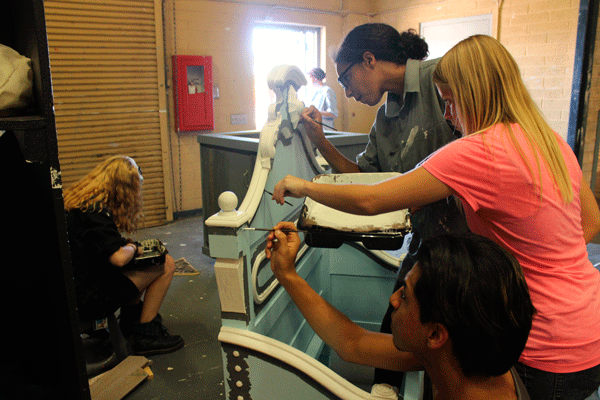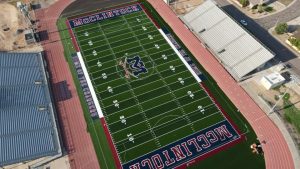The Secret Life of a Techie
September 2, 2015
Their footsteps silently pitter patter across a pitch black stage, moving with the fluidity of ballet dancers and the strength of weight trainers as they swiftly move set pieces off and on stage before the dooming lights strike them and blow their cover. They sweat in hidden rooms as they swirl their makeup brushes like wands and perform magic with their bobby pins. They have the power to transform an average teenager into a queen, a dwarf, anything you could possibly imagine.
They hole up in towering booths, squished together, staring at the actors on stage unblinkingly, waiting for the perfect moment–in an instant the lights flick off or change and they have a moment to breathe before the process repeats.
They whisper silently in a corner, reading from a script under a green light, their fingers always at the ready to cue an explosion or turn on the microphone of an actor hidden from view. They guide you down the dark steps to your seat and hand you programs. They are all around you. They are the techies.
“A lot of people don’t notice them, but the show doesn’t go on without all the crew,” drama teacher and director Tim Cornwell said. “You don’t have sets moved, you don’t have lighting, sound, costumes [without them.] They’re almost more important than the actors themselves.”
Tech crew holds a variety of positions and never ceases to have jobs that must be completed in order for the show to run smoothly. Positions such as lighting, sound, costumes, and makeup, while they are key parts to any performance, tend to go unrecognized. Yet even the littlest tasks can impact any show.
“[Stage crew members are] so ingrained that you need them, unless you want to go watch a play that’s in the dark that you can’t hear- and the actors are naked. There’s so much that a tech crew does and so many jobs. Even besides making programs and you know, walking people to their seats, they’re from every part. You can’t run a show without tech crew,” Cornwell said.
Technical crew is a pretty easy after school activity to pursue. However, it requires a lot of dedication and persistence as well as the ability to handle pressure. After all, you never know what could go wrong during a show.
“In Hello, Dolly!, we had built a trap door that two of the actors were supposed to pop out of and everything goes fine the first show, and then the second show they pop out of it everybody’s cool, everything’s groovy,” stage manager Rowen McLeod said, “And then one of them stomps his foot onto the trap door and you hear like this ‘Crack’. And like everybody backstage is trying to scream, but we can’t obviously because we have to be quiet, because that trap door just broke downwards. So during intermission, which was about 15 minutes, we had to fix the trap door.”
Techies can all say that besides the fear of an unforeseen mishap, the biggest weight on their shoulders is the pressure to get everything done effectively regardless of the recognition some may long for.
“It is somewhat of a thankless job. People don’t see you, they’re not like ‘Oh my god, you did such a good job moving that set’. But, if the set is moved slowly they get criticism,” Cornwell said. “The positive reinforcement isn’t always there, so it’s definitely a difficult job to do”.
But being a crewmember does have its perks, from the adrenaline rush you get as you sneak around like a ninja, to our pizza party you have as a reward for staying at the school until 9pm to practice. Crew isn’t all work and no play.
“I would say that it’s a great experience. You know, we learn a lot about tech theatre, it’s a lot of fun, we just get to hang out and be cool with each other,” McLeod said.
“You get to see behind the scenes of all the plays and stuff, it’s really cool,” running crewmember Rachel McWhirter said. “Once a bunch of us decided to get Boston Market instead of eating pizza with everyone else and we had all this food and it was a lot more than we expected. It was fun.”
Whether you know it or not, techies are everywhere. Whether they’re sneaking around during a show or goofing off during practice they are all around the theatre. Yet no matter what position they hold, techies remain mysterious and go practically unnoticed.
“When I was in high school I was even best friends with the stage manager and I just thought things kind of happened by magic,” Cornwell said. “I didn’t even notice the tech crew, just that sets were there when I needed them and lights turned on when I was onstage. It’s really funny that I just didn’t even notice that.”
Sometimes techies do get the recognition they deserve. Working with actors may seem like it would make crewmembers feel inferior to the performers they work for, but crewmembers are fortunate enough to work with people who remember to respect them.
“At a professional level, you really notice and you’re really thankful for your crew. You treat them with lots of respect because you know that they can control a lot of facets that can either make or break what you’re doing onstage,” Cornwell said.
If you missed out on signing up for crew for this fall play don’t worry, because there’s so much more to come. And becoming a techie really has its own personal worth.
“I would say that it’s a great experience,” McLeod said. “You know, we learn a lot about tech theatre, it’s a lot of fun. We just get to hang out and be cool with each other.”
If you think you can spot the techies, try and find them during the school’s fall play Game of Tiaras Sept. 10th, 11th, or 12th in the Boyle Auditorium. Just think of it as a histrionic version of Where’s Waldo?. And if you do come out to see the play, don’t forget to give both the actors and the techies some love.
As Cornwell said, “The show can’t go on without backstage tech workers.”




